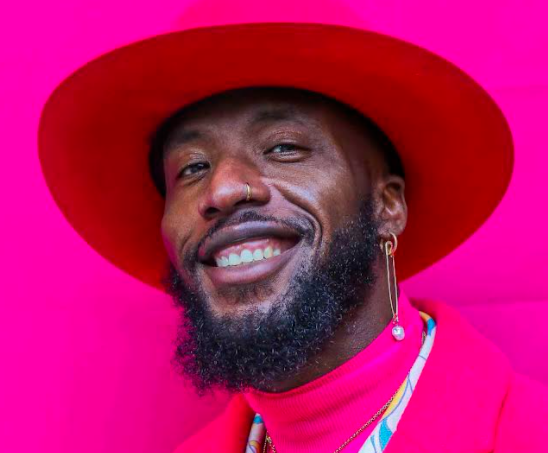Kay Adekunle Rufai is a British-born Nigerian photographer, poet, filmmaker, mental health researcher, playwright, and immersive artist. Kay was born in Poplar, London, but grew up in Nigeria and California. His podcast can be found here.
Within the 21st October session he described how art can act as a vehicle for driving societal change and creating long lasting institutional shifts.
Childhood and upbringing
Kay spoke about his childhood in which Nigerian traditions and culture were heavily enshrined. His career choice as an artist was not in line with his family’s expectations. Indeed, his siblings are either accountants or lawyers. Kay commented that what he describes as his “wide eyed nature” as a kid was stifled by a patriarchal system and expectations around masculinity and although he says that his mother had his best intentions at heart, these were not aligned with what Kay wanted in life.
Career to date
Kay started to really find a love for music when at university. Due to a personal desire to make long standing change, he explored photography, poetry and filmmaking which progressed into his current work challenging stereotypes, especially towards black males.
Recently, Kay has been appointed as the first national police artist in residence in the West Midlands, working in ‘impact’ areas that are overpoliced. By working with them he is able to understand the structures within the police to better support people who have negative direct experience with the police and he examines how police can do their role effectively and respect different cultures.
Kay launched a project called ‘S.M.I.L.E’ where he asked two questions to strangers in the street about what made them smile and what would make them smile even more.
The average guesses to the answers from people do not reflect those given by the respondents. What this exercise shows is that it is important for us all to understand what subconscious stereotypes we all carry as this negatively impacts the work that we do and how we engage with others.
Smiling Boys Project
Two years ago, Kay launched the S.M.I.L.E-ingboys project in response to the rise in young people affected by violence in London. As a result of this, the societal narrative centred around increased police presence and increased jail terms, which were banded about as solutions. As someone who has spent a lot of time working with those from inner city backgrounds, Kay believes that these measures do not lead to a decrease in violence and do not tackle its root causes.
The mission of the S.M.I.L.E-ing boys project is based upon the 8 Pillars of Happiness, to challenge the negative stereotypes around black boys while providing them with positive tools to navigate their mental well-being. This includes supporting them to go beyond the statistics such as Black boys being 5 times more likely to get kicked out of school than any other racial counterpart.
Kay’s mission
Kay has partnerships with approximately 20 schools and his work seeks to challenge institutions to value the mental health of their young people, especially black kids who are disproportionately affected by lack of resources. Although this has become a lot easier as a conversational topic, Kay remarked that there is still a lot of denial, such as teachers saying ‘this doesn’t happen in our school.’
Kay concluded by suggesting that institutions can and should provide outdoor art installations as more accessible forms of art to those who feel excluded, such as minority communities.
What can educational institutions do?
Institutions can fund representative art as part of a long-term plan to instil art within ethos and use art as a bridge for engaging with the community. Many minority communities have historically felt excluded from artistic spaces, due to them feeling intimidating. However, through art, it is possible to create representative legacies.
Kay’s website / S.M.I.L.E-ing boys finding page can be found here.

